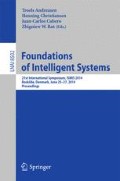Abstract
Community detection is an efficient tool to analyze large complex networks offering new insights about their structures and functioning. A community is a significant organizational unity formed by nodes with more connections between them. Ant colony algorithms have been used to detect communities on a fast and efficient way. In this work, changes are performed on an ant colony algorithm for community detection by means of modularity optimization. The changes rely on the way an ant moves and on the adopted stopping criteria. To assess the proposed strategy, benchmark networks are studied and preliminary results indicate that the suggested changes make the original algorithm more robust, reaching higher values of modularity of the detected communities.
Access this chapter
Tax calculation will be finalised at checkout
Purchases are for personal use only
Preview
Unable to display preview. Download preview PDF.
References
Newman, M.E.J.: The structure and function of complex networks. SIAM Review 45, 167–256 (2010)
Loscalzo, S., Yu, L.: Social Network Analysis: Tasks and Tools. In: Liu, H., Salerno, J.J., Young, M.J. (eds.) Social Computing, Behavioral Modeling, and Prediction, ch. 17. Springer, New York (2008)
Tang, L., Liu, H.: Community Detection and Mining in Social Media, Synthesis Lectures on Data Mining and Knowledge Discovery. Morgan & Claypool (2010)
Fan, T.F., Liau, C.J., Lin, T.Y.: Positional analysis in fuzzy social networks. In: Proceedings of the IEEE International Conference on Granular Computing, San Jose, pp. 423–428 (2007)
Newman, M.E.J., Girvan, M.: Finding and evaluating community structure in networks. Physical Review E 69(2), 26113–26127 (2004)
Newman, M.E.J.: Networks: An Introduction. Oxford University Press, New York (2010)
Tang, L., Liu, H.: Graph Mining Applications to Social Network Analysis. In: Aggarwal, C.C., Wang, H. (eds.) Managing and Mining Graph Data, Advances in Database Systems, vol. 40. Springer, New York (2010)
Dorigo, M., Stützle, T.: Ant Colony Optimization. MIT Press, Massachusetts (2004)
He, D., Liu, J., Liu, D., et al.: Ant colony optimization for community detection in large-scale complex networks. In: 7th International Conference on Natural Computation, Shangai, China, pp. 1151–1155 (2011)
Liu, Y., Liu, L., Luo, J.: Adaptive Ant Colony Clustering Method Applied to Finding Closely Communicating Community. Journal of Networks 7(2), 249–258 (2012)
Geetha, M., Nawaz, G.M.K.: Hierarchical Community-Fuzzy Ant Based Dynamic Routing on Large Road Networks. Research Journal of Applied Sciences 8(1), 65–71 (2013)
Romdhane, L.B., Chaabani, Y., Zardi, H.: A robust ant colony optimization-based algorithm for community mining in large scale oriented social graphs. Expert Systems with Applications 40(14), 5709–5718 (2013)
Blondel, V.D., Guillaume, J.-L., Lambiotte, R., Lefebvre, E.: Fast unfolding of communities in large networks. Journal of Statistical Mechanics 2008(10), P10008 (2008)
Kirkpatrick, S., Gelatt, C.D., Vecchi, M.P.: Optimization by Simulated Annealing. Science 220(4598), 671–680 (1983)
Lumer, E.D., Faieta, B.: Diversity and adaptation in populations of clustering ants. In: Meyer, J.-A., Wilson, S.W. (eds.) Proceedings of the Third International Conference on Simulation of Adaptive Behavior: From Animals to Animats 3, pp. 501–508. MIT Press, Massachusetts (1994)
Deneubourg, J.-L., Goss, S., Franks, N., et al.: The dynamics of collective sorting: Robot-like ants and ant-like robots. In: Meyer, J.-A., Wilson, S.W. (eds.) Proceedings of the First International Conference on Simulation of Adaptive Behavior: From Animals to Animats, pp. 356–363. MIT Press, Massachusetts (1991)
Urbani, C.B., Boyan, G.S., Blarer, A., et al.: A novel mechanism for jumping in the Indian ant Harpegnathos saltator (Jerdon) (Formicidae, Ponerinae). Experientia 50(1), 63–71 (1994)
Jin, D., Liu, D., Yang, B., et al.: Ant Colony Optimization with a New Random Walk Model for Community Detection in Complex Networks. Advances in Complex Systems 14(5), 795–815 (2011)
Author information
Authors and Affiliations
Editor information
Editors and Affiliations
Rights and permissions
Copyright information
© 2014 Springer International Publishing Switzerland
About this paper
Cite this paper
de Andrade, L.P., Espíndola, R.P., Ebecken, N.F.F. (2014). Community Detection by an Efficient Ant Colony Approach. In: Andreasen, T., Christiansen, H., Cubero, JC., Raś, Z.W. (eds) Foundations of Intelligent Systems. ISMIS 2014. Lecture Notes in Computer Science(), vol 8502. Springer, Cham. https://doi.org/10.1007/978-3-319-08326-1_1
Download citation
DOI: https://doi.org/10.1007/978-3-319-08326-1_1
Publisher Name: Springer, Cham
Print ISBN: 978-3-319-08325-4
Online ISBN: 978-3-319-08326-1
eBook Packages: Computer ScienceComputer Science (R0)

